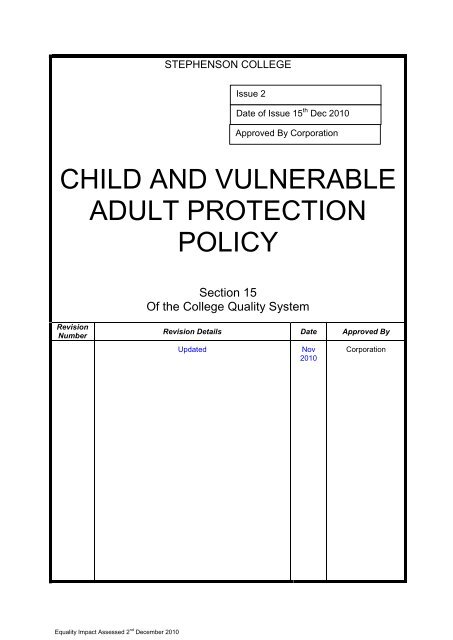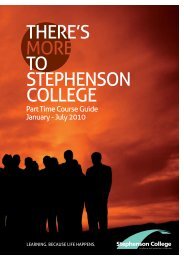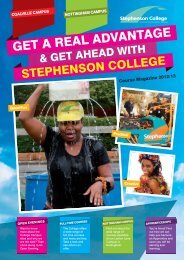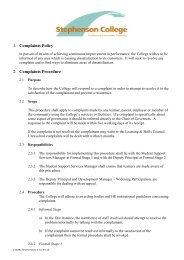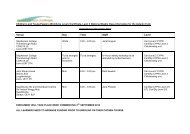child and vulnerable adult protection policy - Stephenson College
child and vulnerable adult protection policy - Stephenson College
child and vulnerable adult protection policy - Stephenson College
Create successful ePaper yourself
Turn your PDF publications into a flip-book with our unique Google optimized e-Paper software.
STEPHENSON COLLEGEIssue 2Date of Issue 15 th Dec 2010Approved By CorporationCHILD AND VULNERABLEADULT PROTECTIONPOLICYSection 15Of the <strong>College</strong> Quality SystemRevisionNumberRevision Details Date Approved ByUpdatedNov2010CorporationEquality Impact Assessed 2 nd December 2010
Child <strong>and</strong> Vulnerable Adult Protection Policy <strong>and</strong> ProceduresCHILD AND VULNERABLE ADULT PROTECTION POLICY1) Policy Statementa) <strong>Stephenson</strong> <strong>College</strong> fully recognises its responsibility for <strong>child</strong> <strong>and</strong> <strong>vulnerable</strong> <strong>adult</strong><strong>protection</strong> <strong>and</strong> for safeguarding <strong>and</strong> promoting the welfare of young people <strong>and</strong><strong>vulnerable</strong> <strong>adult</strong>s.b) The <strong>College</strong> aims to create <strong>and</strong> maintain a safe environment for young people <strong>and</strong>similarly for students who are over eighteen, staff, volunteers, <strong>and</strong> visitors.2) Coveragea) The <strong>policy</strong> applies to all governors, staff, agency workers, contractors, visitors <strong>and</strong>volunteers working in the college.3) Definitionsa) For the purposes of the Child <strong>and</strong> Vulnerable Adult Protection Policyi) a ‘young person’ means any person under the age of 18 (i.e. those who have notyet reached their 18th birthday).ii) a ‘<strong>vulnerable</strong> <strong>adult</strong>’ means any person " who is or may be in need of communitycare services by reason of mental or other disability, age or illness; <strong>and</strong> who is ormay be unable to take care of him or herself, or unable to protect him or herselfagainst significant harm or exploitation because of mental or other disability, ageor illness.”iii) ‘staff’ means all employees, full-time <strong>and</strong> fractional, <strong>and</strong> all agency, franchise,contract <strong>and</strong> volunteer staff working for the <strong>College</strong>.4) Aims of Child <strong>and</strong> Vulnerable Adult Protection Policya) The aims of the <strong>policy</strong> arei) To promote an environment that is safe, where staff <strong>and</strong> students treat eachother with mutual respect <strong>and</strong> develop good relationships built on trust.ii) To raise the awareness of all staff, teaching <strong>and</strong> non-teaching, of the need tosafeguard young people <strong>and</strong> <strong>vulnerable</strong> <strong>adult</strong>s <strong>and</strong> of their rights <strong>and</strong>responsibilities in identifying <strong>and</strong> reporting possible cases of abuse.iii) To provide a systematic means of supporting young people <strong>and</strong> <strong>vulnerable</strong> <strong>adult</strong>sknown or thought to be at risk of harm.iv) To ensure that relevant information about a young person or <strong>vulnerable</strong> <strong>adult</strong> atrisk of harm is disseminated to appropriate staff within the <strong>College</strong> on a ‘need toknow’ basis.v) To develop a structured college procedure which will be followed by all membersof the <strong>College</strong> staff in cases of suspected abuse.vi) To support the development of effective working relationships with otheragencies, especially the Police <strong>and</strong> Children’s Services.vii) To ensure that all staff who have access to young people or <strong>vulnerable</strong> <strong>adult</strong>shave been checked for their suitability.viii) To ensure that all relevant policies <strong>and</strong> procedures within the <strong>College</strong> are linkedto, <strong>and</strong> comply with, the <strong>Stephenson</strong> <strong>College</strong> Child <strong>and</strong> Vulnerable AdultProtection Policy <strong>and</strong> Procedures.Equality Impact Assessed 2 nd December 2010 2
Child <strong>and</strong> Vulnerable Adult Protection Policy <strong>and</strong> Proceduresix) To support young people’s <strong>and</strong> <strong>vulnerable</strong> <strong>adult</strong>s’ development in ways that willfoster security, confidence <strong>and</strong> independence.5) Key Safeguarding Principlesa) <strong>Stephenson</strong> <strong>College</strong> is committed to follow the key safeguarding principles outlinedby the Local Safeguarding Children Boards <strong>and</strong> the guidance of the Department forChildren Schools <strong>and</strong> Families.i) The needs of the young person are paramount <strong>and</strong> underpin all <strong>child</strong> <strong>protection</strong>work <strong>and</strong> resolve any conflict of interestsii) All young people have the right to be safeguarded from harm <strong>and</strong> exploitationiii) <strong>College</strong>s have a responsibility to provide a safe environment <strong>and</strong> minimise risksof harm to young people’s welfareiv) Staff have a responsibility to identify young people who are suffering or likely tosuffer significant harm <strong>and</strong> take appropriate action with the aim of making surethey are kept safe both at home <strong>and</strong> at collegev) Responsibility for <strong>protection</strong> of young people must be shared because youngpeople are safeguarded only when all relevant agencies <strong>and</strong> individuals acceptresponsibility <strong>and</strong> co-operate with one anothervi) Statements about or allegations of abuse or neglect made by young people mustbe taken seriouslyb) <strong>Stephenson</strong> <strong>College</strong> is further committed to applying these safeguarding principles to<strong>vulnerable</strong> <strong>adult</strong>s6) Responsibility for Child <strong>and</strong> Vulnerable Adult Protectiona) A nominated governor (see Annex D) will be responsible for the oversight of <strong>child</strong><strong>and</strong> <strong>vulnerable</strong> <strong>adult</strong> <strong>protection</strong> <strong>policy</strong> <strong>and</strong> procedures.b) A Designated Senior Person (see Annex D) will take lead responsibility for <strong>child</strong> <strong>and</strong><strong>vulnerable</strong> <strong>adult</strong> <strong>protection</strong> <strong>and</strong> receive appropriate training <strong>and</strong> support <strong>and</strong>adequate resources to carry out this role.c) The college will in addition have a Safeguarding <strong>and</strong> Protection team who willdeputise for the Designated Senior Person <strong>and</strong> will also lead on the implementationof this <strong>policy</strong> in the areas of the college for which they have responsibility. TheSafeguarding <strong>and</strong> Protection Team are listed in Annex Dd) All staff are expected to contact either the Designated Senior Person, or one of theSafeguarding <strong>and</strong> Protection Team for advice, when necessary, or to make referrals.7) Staff Appointmentsa) <strong>Stephenson</strong> <strong>College</strong> will ensure that all college staff have been checked for theirsuitability before taking up their appointmentb) All applicants will be scrutinised by.i) Verifying identity <strong>and</strong> any academic or vocational qualifications.ii) Obtaining professional <strong>and</strong> character references.iii) Checking previous employment history.iv) Checking that a c<strong>and</strong>idate has the health <strong>and</strong> physical capacity for the job.v) Holding face to face interviews.vi) Carrying out the m<strong>and</strong>atory check of List 99 or through the Vetting <strong>and</strong> BarringSchemeEquality Impact Assessed 2 nd December 2010 3
Child <strong>and</strong> Vulnerable Adult Protection Policy <strong>and</strong> Proceduresvii) Where appropriate, a Criminal Records Bureau check before the c<strong>and</strong>idate takesup the post.8) Work Experiencea) <strong>Stephenson</strong> <strong>College</strong> will ensure that:i) Appropriate health <strong>and</strong> safety checks are in place prior to establishing workexperience placements.ii) Employers are aware of their responsibilities in relation to safeguarding <strong>and</strong> the<strong>protection</strong> of <strong>child</strong>ren or <strong>vulnerable</strong> <strong>adult</strong>s.iii) Staff are aware of the action to be taken, <strong>and</strong> by whom, should a <strong>child</strong> or<strong>vulnerable</strong> <strong>adult</strong> <strong>protection</strong> issue be raised before, during or after the placement.iv) Additional safeguards, will be made when there are certain risk factors present.The risk factors include:(1) A young person or <strong>vulnerable</strong> <strong>adult</strong> likely to be or will be alone with an <strong>adult</strong>as part of the work placement. (NB. This does not apply to short periodsalone, for example, a solicitor taking a student to <strong>and</strong> from court in a properlyinsured car).(2) The student who is <strong>vulnerable</strong>. The <strong>College</strong> will identify to the placementorganiser any student who may be <strong>vulnerable</strong>, for example, because ofspecial needs, immaturity, abuse or neglect, substance misuse, etc, <strong>and</strong> whomay therefore require additional safeguards.9) Staff Training on <strong>Stephenson</strong> <strong>College</strong> Proceduresa) <strong>Stephenson</strong> <strong>College</strong> will ensure thati) The Designated Senior Person responsible for Child <strong>and</strong> Vulnerable AdultProtection will receive training in inter-agency procedures which gives them theknowledge <strong>and</strong> skills needed to fulfil their responsibilities <strong>and</strong> will undertakerefresher training at 2 yearly intervals.ii) All new members of staff <strong>and</strong> governors will be made aware of the <strong>Stephenson</strong><strong>College</strong> <strong>child</strong> <strong>and</strong> <strong>vulnerable</strong> <strong>adult</strong> <strong>protection</strong> <strong>policy</strong> <strong>and</strong> procedures during theirinduction into the <strong>College</strong>.iii) All staff <strong>and</strong> governors will receive initial training on the <strong>College</strong>’s <strong>child</strong> <strong>and</strong><strong>vulnerable</strong> <strong>adult</strong> <strong>protection</strong> <strong>policy</strong> <strong>and</strong> procedures <strong>and</strong> undertake suitablerefresher training at 3 yearly intervals.b) The initial training will ensure that all staff.i) Know who to contact if they have a concern that a young person or <strong>vulnerable</strong><strong>adult</strong> is at risk of serious harm.ii) Know where to go for advice in relation to safeguarding or <strong>protection</strong> issues orwhen they are uncertain about whether to refer a concern about a <strong>child</strong> or<strong>vulnerable</strong> <strong>adult</strong>.iii) Know the <strong>College</strong> procedure for referrals on <strong>child</strong> <strong>and</strong> <strong>vulnerable</strong> <strong>adult</strong> <strong>protection</strong>issues.iv) Underst<strong>and</strong> that they have the right to contact the appropriate agencies if theyfeel that concerns are not being passed on appropriately by designated collegestaff.v) Are aware of the requirement to keep detailed, accurate, secure written recordsof any referrals or concerns.Equality Impact Assessed 2 nd December 2010 4
Child <strong>and</strong> Vulnerable Adult Protection Policy <strong>and</strong> Proceduresvi) Are able to recognise <strong>and</strong> respond to safeguarding <strong>and</strong> welfare concerns.vii) Underst<strong>and</strong> their responsibilities in being alert to the signs of abuse.viii) Know how to respond to a student who discloses abuse or is at risk of self harm.ix) Know the <strong>College</strong>’s <strong>policy</strong> <strong>and</strong> procedures on Confidentiality <strong>and</strong> Disclosure inChild <strong>and</strong> Vulnerable Adult Protection cases.x) Underst<strong>and</strong> that there is a need to take special care when working with youngpeople with special needs or <strong>vulnerable</strong> <strong>adult</strong>s to be alert to signs of abuse asthese members of the college may not be able to raise concerns themselves.xi) Are aware of appropriate approaches to confidentiality <strong>and</strong> disclosure ofinformation.c) Guidance on relationships with studentsi) <strong>Stephenson</strong> <strong>College</strong> will:(1) Provide staff with guidance on appropriate relationships with students (AnnexB).(2) Have procedures in place for dealing with allegations of abuse againstmembers of staff <strong>and</strong> volunteers (Annex E)10) Confidentiality, Reporting <strong>and</strong> Disclosurea) The college recognises the need to comply with relevant legislation <strong>and</strong> guidance inrelation to data <strong>protection</strong> <strong>and</strong> confidentiality.b) It is also recognised that, where there are concerns about abuse or safeguarding,data sharing with appropriate agencies may be necessary even when it is contrary tothe wishes of an individual.c) The circumstances when data should or should not be shared are outlined in a flowchart at Annex C.d) The following issues will inform decisions about sharing data:i) <strong>Stephenson</strong> <strong>College</strong> will ensure that as part of the <strong>child</strong> <strong>and</strong> <strong>vulnerable</strong> <strong>adult</strong><strong>protection</strong> training for staff, the issue of confidentiality is clarified so that staffknow they cannot promise confidentiality in all cases as they may have to passon information to other professionals to keep the young person or <strong>vulnerable</strong><strong>adult</strong> safe.ii) The principle of ‘proportionality’ applies to sharing confidential information, i.e.when disclosing information without consent the member of staff limits the extentof the disclosure to that which is absolutely necessary to protect the youngperson or <strong>vulnerable</strong> <strong>adult</strong>.iii) <strong>Stephenson</strong> <strong>College</strong> recognises that young people aged 16 or 17 will have theunderst<strong>and</strong>ing to make decisions about their own lives <strong>and</strong> their views <strong>and</strong>wishes will be respected unless they are deemed to be at risk of harm which is aserious threat to their personal safety or they are the victim of a crime.iv) Young people under 16 may be sufficiently mature to underst<strong>and</strong> <strong>and</strong> consent tothe disclosure of information. The young person’s ability to make such decisionsshould be assessed on a case-by-case basis.v) Referrals to other agencies such as Children’s Social Care should be made withthe young person’s agreement where practicable. However, it may not bepracticable to seek their agreement where, for example, seeking permissionmight place them or another person at risk of serious harm or where they are notEquality Impact Assessed 2 nd December 2010 5
Child <strong>and</strong> Vulnerable Adult Protection Policy <strong>and</strong> Proceduresmentally competent to give their agreement. There may also be cases where theyoung person’s agreement is sought but they refuse to give that agreement.vi) Disclosure of information can take place without consent in cases where this isjustifiable in the overriding public interest – e.g. to protect the young person fromsignificant harm.vii) In the context of <strong>child</strong> <strong>protection</strong> the welfare of the young person outweighs thefamily's right to privacy.viii) Vulnerable <strong>adult</strong>s may choose to remain at risk in dangerous situations.Professional staff may find they have no statutory powers in cases where the<strong>adult</strong> is judged to have sufficient capacity to make his or her own choices <strong>and</strong>refuses the help which staff feel is needed <strong>and</strong> where public interestconsiderations do not apply.ix) In these cases, where a member of the college staff considers that the decisionsof the <strong>vulnerable</strong> <strong>adult</strong> should be respected they must immediately seek advicefrom the college’s Senior Manager responsible for Child <strong>and</strong> Vulnerable AdultProtection.x) Decisions about the capacity <strong>and</strong> the ability of the <strong>vulnerable</strong> <strong>adult</strong> to giveinformed consent are a matter of medical judgement <strong>and</strong> multi-disciplinaryassessment. There should be no ab<strong>and</strong>onment of the duty to care.e) Reportingi) The college will routinely report to the Local Authority Designated Officer (LSCB)in any case involving concerns of malpractice, abuse or poor professionalpractice by:(1) A local authority(2) A college employee(3) A volunteer11) Record Keeping(4) A paid or unpaid carer, relative or friend(5) An employee of a private care agency(6) An employee of another organisation providing care to the <strong>vulnerable</strong> <strong>adult</strong>a) An accurate record should be made whenever there is a concern about a <strong>child</strong> or<strong>vulnerable</strong> <strong>adult</strong> in terms of risk of harm or safeguarding.b) The record should include:i) Appropriate personal details of the <strong>child</strong> or <strong>vulnerable</strong> <strong>adult</strong>.ii) The nature of the concern.iii) The source(s) of information about the concern.iv) Any advice given.v) Whether confidentiality has been discussed with the <strong>child</strong> or <strong>vulnerable</strong> <strong>adult</strong>.vi) Names of staff with whom discussedvii) Details of action taken or any referral to an external agencyviii) Date <strong>and</strong> name of the person making the recordEquality Impact Assessed 2 nd December 2010 6
Child <strong>and</strong> Vulnerable Adult Protection Policy <strong>and</strong> Procedures12) Raising awareness of safeguarding <strong>and</strong> <strong>protection</strong> issuesa) Parents/carers of students under eighteen will be made aware of the responsibilitiesof staff members with regard to <strong>child</strong> <strong>protection</strong> procedures by publicising this on thecollege website.b) All students will be supported to underst<strong>and</strong> safeguarding <strong>and</strong> <strong>protection</strong> issuesthrough:i) A tutorial programme that will support young people’s <strong>and</strong> <strong>vulnerable</strong> <strong>adult</strong>s’development in ways that will foster security, confidence <strong>and</strong> independence.ii) The creation of a climate in which responsible behaviour is encouraged <strong>and</strong>where students feel safe to ask for help if threatened or at risk of abuse.iii) The promotion of a healthy lifestyle that includes consideration of diet, sexualrelationships, alcohol <strong>and</strong> drug abuse.13) Monitoring <strong>and</strong> Review of the Policy1. <strong>Stephenson</strong> <strong>College</strong> will review its policies <strong>and</strong> procedures to ensure that theycomply with the relevant legislation <strong>and</strong> the agreed procedures. The Child <strong>and</strong>Vulnerable Adult Protection Policy will be reviewed annually <strong>and</strong> updated to remedyany deficiencies or weakness in regard to <strong>child</strong> <strong>and</strong> <strong>vulnerable</strong> <strong>adult</strong> <strong>protection</strong>arrangements that are identified without delay.Equality Impact Assessed 2 nd December 2010 7
Child <strong>and</strong> Vulnerable Adult Protection Policy <strong>and</strong> Procedures1) Definitions of AbuseAnnex Aa) Physical abusei) This may take many forms e.g. hitting, shaking or poisoning a young person or<strong>vulnerable</strong> <strong>adult</strong>. It may also be caused when a parent or carer feigns thesymptoms of, or deliberately causes, ill health to a young person or <strong>vulnerable</strong><strong>adult</strong>.b) Emotional abusei) This is the persistent emotional ill treatment of a young person or <strong>vulnerable</strong> <strong>adult</strong>such as to cause severe <strong>and</strong> persistent effects on their emotional development.Some level of emotional abuse is involved in most types of ill treatment of youngpeople or <strong>vulnerable</strong> <strong>adult</strong>s, though emotional abuse may occur alone.c) Sexual abusei) This involves forcing or enticing a young person or <strong>vulnerable</strong> <strong>adult</strong> to take part insexual activities. This may include non-contact activities such as looking at, or inthe production of pornographic materials, watching sexual activities orencouraging young people or <strong>vulnerable</strong> <strong>adult</strong>s to behave in sexuallyinappropriate ways.d) Neglecti) Involves the persistent failure to meet a young person’s or <strong>vulnerable</strong> <strong>adult</strong>’sbasic physical <strong>and</strong>/or psychological needs, likely to result in the seriousimpairment of their health <strong>and</strong> development. This may involve failure to ensureaccess to appropriate medical care or treatment. It may also include neglect ofbasic emotional needs.2) The Context of Abusea) Family Circumstances: Domestic Violencei) Where there is domestic violence the implications for the <strong>vulnerable</strong> <strong>adult</strong> oryoung person at college <strong>and</strong> for younger <strong>child</strong>ren in the household must beconsidered. Young people from families with a history of domestic violence oftenhave behavioural difficulties, absenteeism, ill health, bullying, <strong>and</strong> drug <strong>and</strong>alcohol misuse.b) Drug/alcohol abusing parentsi) There is an increased risk of violence in families where this occurs. A youngperson at <strong>College</strong> may have to take on responsibilities for younger <strong>child</strong>ren in thefamily.c) Forced Marriagesi) Forced marriage is an entirely separate issue from arranged marriage. Forcedmarriage is a human rights abuse <strong>and</strong> falls within the Crown. Prosecution Servicedefinition of domestic violence. Young people at risk of a forced marriage areusually experiencing physical <strong>and</strong>/or emotional abuse at home.d) Mental Health Issuesi) Self-harming <strong>and</strong> suicidal behaviourii) Self harm, suicide threats <strong>and</strong> gestures by a young person or <strong>vulnerable</strong> <strong>adult</strong>must always be taken seriously <strong>and</strong> may be indicative of a serious mental oremotional disturbance. The possibility that self-harm, including a serious eatingEquality Impact Assessed 2 nd December 2010 8
Child <strong>and</strong> Vulnerable Adult Protection Policy <strong>and</strong> Proceduresnecessary. Such interviews should be conducted in a room with visual access or an areawhich is likely to be frequented by other people. Another student should be present ornearby. Where such conditions cannot apply, staff should ensure that another <strong>adult</strong> knowsthat the interview is taking place.8. Students should not be asked or encouraged to visit the home of a member of staff orsocialise informally outside college. These contacts or visits can place staff in a <strong>vulnerable</strong>position <strong>and</strong> can in some case lead to allegations being made against staff. Private oradditional tuition for students should be conducted on college premises.9. The following are examples of actions, albeit not overtly abusive, that could be interpreted asa member of staff 'grooming' a student or allowing a dependent relationship to begin orcontinue.1. Inviting students to their home.2. Visiting students at their home.3. Giving students gifts.4. Offering students lifts outside normal duties.5. Singling individual students out for special attention.6. Seeing students socially.7. Giving students their mobile or home telephone numberThe frequency, nature <strong>and</strong> degree of such behaviour may justify the need for furtherinvestigation.Physical Contact10.Physical contact may be misconstrued by a student, parent or observer. Touchingstudents, including well-intentioned gestures such as putting a h<strong>and</strong> on a shoulder, can, ifrepeated regularly, lead to serious questions being raised, particularly if this occurs when amember of staff is alone with a student. As a general principle, staff must not makegratuitous physical contact with their students. It is particularly unwise to attribute touchingto their teaching style or as a way of relating to students.11.There may also be occasions where a distressed student needs comfort <strong>and</strong> reassurancewhich may include physical comforting such as caring parent would give. Staff should usetheir discretion in such cases to ensure that what is normal <strong>and</strong> natural does not becomeunnecessary <strong>and</strong> unjustified contact, particularly with the same student over a period of time.Where a member of staff has particular concern about the need to provide this type of care<strong>and</strong> reassurance they should seek the advice of the Director of Quality/Personnel Manager.12.Some staff are also likely to come into physical contact with students from time to time inthe course of their duties. Examples of this could include sports coaching which may involvenon-sexual physical contact. Contact of this type should not take place when a member ofstaff is alone with a student.13.In care situations where a student may require assistance with personal care such astoileting. Staff should respect the student’s right to dignity <strong>and</strong> the level of support neededagreed with the student. Staff should be aware of the limits within which such contact shouldproperly take place <strong>and</strong> of the possibility of such contact being misinterpreted. Staff shouldinform their line manager of the level of support they have agreed with the student.Equality Impact Assessed 2 nd December 2010 11
Child <strong>and</strong> Vulnerable Adult Protection Policy <strong>and</strong> ProceduresChild Protection <strong>and</strong> the Protection of Vulnerable AdultsPrinciples for information sharingAnnex CYou are asked to or wish to share informationYesIs there a legitimate purpose for sharing information?NoNoDoes the information enable a person to be identified?YesNoIs the information confidential?YesYesDo you have consent?NoYesDo you have a statutory obligation or court order toshare information?NoYesIs there sufficient public interest to share?NoYou mayshareDo not shareShare information• Decide how much to share <strong>and</strong> with whom.• Distinguish fact from opinion.• Ensure that you are giving the information to the right person (recordhow you have verified that) <strong>and</strong> record the information shared.• Inform the person concerned that information has been shared(providing it will not create or increase the risk of harm).Record the information sharing decision <strong>and</strong> your reasonsEquality Impact Assessed 2 nd December 2010 12
Child <strong>and</strong> Vulnerable Adult Protection Policy <strong>and</strong> ProceduresAnnex DCHILD AND VULNERABLE ADULT PROTECTION POLICYNominated Governor for SafeguardingName Job Title Telephone Ext NoChris Brown 105Designated Senior PersonName Job Title Telephone Ext NoRachel Gordon Director of Quality 107Safeguarding <strong>and</strong> Child Protection OfficersName Job Title Telephone Ext NoLynette Parker Student Services Manager 241Jane FosterSchool Partnerships & Inclusion 118ManagerAndy Allsop Health & Safety Officer 237Sam Girvan Trainer C for Construction 270Parvinder Pabla Student Services Co-ordinator,Nottingham403Equality Impact Assessed 2 nd December 2010 13
Child <strong>and</strong> Vulnerable Adult Protection Policy <strong>and</strong> ProceduresAnnex EREPORTING AND DEALING WITH ALLEGATIONS OF ABUSE AGAINSTMEMBERS OF STAFFThis procedure has been drawn up in consultation with staff, unions <strong>and</strong> the LocalSafeguarding Children Board.The procedures apply to all staff, whether teaching, administrative, management or support,as well as to volunteers. The word “staff” is used for ease of description.1 Introduction1.1 In rare instances, staff of education institutions have been found responsiblefor <strong>child</strong> abuse. Because of their frequent contact with <strong>child</strong>ren <strong>and</strong> young people,staff may have allegations of <strong>child</strong> abuse made against them. The <strong>College</strong>recognises that an allegation of <strong>child</strong> abuse made against a member of staff may bemade for a variety of reasons <strong>and</strong> that the facts of the allegation may or may not betrue. It is imperative that those dealing with an allegation maintain an open mind <strong>and</strong>that investigations are thorough <strong>and</strong> not subject to delay.1.2 The <strong>College</strong> recognises that the Children Act 1989 states that the welfare ofthe <strong>child</strong> is the paramount concern. It is also recognised that hasty or ill-informeddecisions in connection with a member of staff can irreparably damage anindividual’s reputation, confidence <strong>and</strong> career. Therefore, those dealing with suchallegations within the <strong>College</strong> will do so with sensitivity <strong>and</strong> will act in a careful,measured way.2 Receiving an Allegation2.1 A member of staff who receives an allegation about another member of staffshould follow the guidelines in Part C for dealing with disclosure2.2 The allegation should be reported immediately to the Principal, unless thePrincipal is the person against whom the allegation is made, in which case the reportshould be made to the Senior Staff Member with Lead Responsibility [or theDesignated Governor]. The Principal (or designated person if the allegation isagainst the Principal) should:2.2.1 Obtain written details of the allegation from the person whoreceived it, that are signed <strong>and</strong> dated. The written details should becountersigned <strong>and</strong> dated by the Principal (or designated person).2.2.2 Record information about times, dates, locations <strong>and</strong> names ofpotential witnesses.3 Initial Assessment by The Principal (or designated person)3.1 The Principal (or designated person) should make an initial assessment of theallegation, consulting with the Senior Staff Member with Lead Responsibility, theDesignated Governor <strong>and</strong> the local social services department or agency asdetermined by local arrangements as appropriate. Where the allegation isconsidered to be either a potential criminal act or indicates that the <strong>child</strong> hassuffered, is suffering or is likely to suffer significant harm, the matter should bereported immediately to the local social services department.Equality Impact Assessed 2 nd December 2010 14
Child <strong>and</strong> Vulnerable Adult Protection Policy <strong>and</strong> Procedures3.2 It is important that the Principal (or designated person) does not investigatethe allegation. The initial assessment should be on the basis of the informationreceived <strong>and</strong> is a decision whether or not the allegation warrants furtherinvestigation.3.3 Other potential outcomes are:3.3.1 The allegation represents inappropriate behaviour or poorpractice by the member of staff <strong>and</strong> is neither potentially a crime nor acause of significant harm to the <strong>child</strong>. The matter should be addressed inaccordance with the <strong>College</strong> disciplinary procedures.3.3.2 The allegation can be shown to be false because the factsalleged could not possibly be true.4 Enquiries <strong>and</strong> Investigations4.1 Child <strong>protection</strong> enquiries by social care or the police are not to be confusedwith internal, disciplinary enquiries by the <strong>College</strong>. The <strong>College</strong> may be able to usethe outcome of external agency enquiries as part of its own procedures. The <strong>child</strong><strong>protection</strong> agencies, including the police, have no power to direct the <strong>College</strong> to actin a particular way, however, the <strong>College</strong> should assist the agencies with theirenquiries.4.2 The <strong>College</strong> shall hold in abeyance its own internal enquiries while the formalpolice or social services investigations proceed; to do otherwise may prejudice theinvestigation. Any internal enquiries shall conform with the existing staff disciplinaryprocedures.4.3 If there is an investigation by an external agency, for example the police, thePrincipal (or designated person) should normally be involved in, <strong>and</strong> contribute to,the inter-agency strategy discussions. The Principal (or designated person) isresponsible for ensuring that the <strong>College</strong> gives every assistance with the agency’senquiries. At this stage agreement should be reached that police <strong>and</strong>/or socialservices information gathered during their inquiries, including witness statements, willbe made available to the college to assist with any internal inquiries. He/she willensure that appropriate confidentiality is maintained in connection with the enquiries,in the interests of the member of staff about whom the allegation is made. ThePrincipal (or designated person) shall advise the member of staff that he/she shouldconsult with a representative, for example, a trade union.4.4 The Principal (or designated person) will consult with the police or otherinvestigating agency (eg social care), particularly in relation to timing <strong>and</strong> content ofthe information to be provided, <strong>and</strong> shall:4.4.1 inform the young person/<strong>vulnerable</strong> <strong>adult</strong> or parent/carermaking the allegation that the investigation is taking place <strong>and</strong> what thelikely process will involve.4.4.2 Ensure that the parents/carers of the young person/<strong>vulnerable</strong><strong>adult</strong> making the allegation have been informed that the allegation hasbeen made <strong>and</strong> what the likely process will involve.Equality Impact Assessed 2 nd December 2010 15
Child <strong>and</strong> Vulnerable Adult Protection Policy <strong>and</strong> Procedures4.4.3 Inform the member of staff against whom the allegation wasmade of the fact that the investigation is taking place <strong>and</strong> what the likelyprocess will involve.4.4.4 Inform the Chair of Governors (<strong>and</strong>/or the designatedgovernor) of the allegation <strong>and</strong> the investigation.4.5 The Principal (or designated person) shall keep a written record of the actiontaken in connection with the allegation.5 Suspension of Staff5.1 Suspension should not be automatic. In respect of staff other than thePrincipal, suspension can only be carried out by the Principal. In respect of thePrincipal, suspension can only be carried out by the Chair of Governors (or in his/herabsence, the Vice Chair).5.2 Suspension may be considered at any stage of the investigation. It is aneutral, not a disciplinary, act <strong>and</strong> shall be on full pay. Consideration should be givento alternatives: eg paid leave of absence; agreement to refrain from attending work;change of, or withdrawal from, specified duties.5.3 Suspension should only occur for a good reason. For example:5.3.1 where a young person or <strong>vulnerable</strong> <strong>adult</strong> is at risk.5.3.2 where the allegations are potentially sufficiently serious tojustify dismissal on the grounds of gross misconduct.5.3.3 where necessary for the good <strong>and</strong> efficient conduct of theinvestigation.5.4 If suspension is being considered, the member of staff should be encouragedto seek advice, for example from a trade union.5.5 Prior to making the decision to suspend, the Principal (or Chair or Vice Chairof Governors) should interview the member of staff. This should occur with theapproval of the appropriate agency [identified by the LSCB]. In particular, if thepolice are engaged in an investigation the officer in charge of the case should beconsulted.5.6 The member of staff should be advised to seek the advice <strong>and</strong>/or assistanceof his/her trade union <strong>and</strong> should be informed that they have the right to beaccompanied by a friend. The member of staff should be informed that an allegationhas been made <strong>and</strong> that consideration is being given to suspension. It should bemade clear that the interview is not a formal disciplinary hearing, but solely for raisinga serious matter which may lead to suspension <strong>and</strong> further investigation.5.7 During the interview, the member of staff should be given as muchinformation as possible, in particular the reasons for any proposed suspension,provided that doing so would not interfere with the investigation into the allegation.The interview is not intended to establish the member of staff’s innocence or guilt, butgive the opportunity for the member of staff to make representations about possiblesuspension. The member of staff should be given the opportunity to consider anyEquality Impact Assessed 2 nd December 2010 16
Child <strong>and</strong> Vulnerable Adult Protection Policy <strong>and</strong> Proceduresinformation given to him/her at the meeting <strong>and</strong> prepare a response, although thatadjournment may be brief.5.8 If the Principal (or Chair, or Vice Chair, of Governors) considers thatsuspension is necessary, the member of staff shall be informed that he/she issuspended from duty. Written confirmation of the suspension, with reasons, shall bedespatched as soon as possible, <strong>and</strong> ideally within one working day.5.9 Where a member of staff is suspended, the Principal (or Chair, or Vice Chair,of Governors) should address the following issues:5.9.1 the Chair of Governors should be informed of the suspensionin writing.5.9.2 the Governing Body should receive a report that a member ofstaff has been suspended pending investigation, the detail given to thegoverning body should be minimal5.9.3 where the Principal has been suspended, the Chair or ViceChair of Governors will need to take action to address the management ofthe <strong>College</strong>5.9.4 the parents/carers of the young person or <strong>vulnerable</strong> <strong>adult</strong>making the allegation should be informed of the suspension. They shouldbe asked to treat the information as confidential. Consideration should begiven to informing the young person or <strong>vulnerable</strong> <strong>adult</strong> making theallegation of the suspension5.9.5 senior staff who need to know of the reason for the suspensionshould be informed5.9.6 depending on the nature of the allegation, the Principal shouldconsider [with the nominated Governor] whether a statement to thestudents of the <strong>College</strong> <strong>and</strong>/or parents/carers should be made, taking dueregard of the need to avoid unwelcome publicity5.10 The Principal shall consider carefully <strong>and</strong> review the decisions as to who isinformed of the suspension <strong>and</strong> investigation. The LSCB <strong>and</strong> external investigatingauthorities should be consulted.5.11 The suspended member of staff should be given appropriate support duringthe period of suspension. He/she should also be provided with information onprogress <strong>and</strong> developments in the case at regular intervals.5.12 The suspension should remain under review in accordance with the <strong>College</strong>disciplinary procedures.6 The Disciplinary Investigation6.1 The disciplinary investigation should be conducted in accordance with theexisting staff disciplinary procedures.6.2 The member of staff should be informed of:6.2.1 the disciplinary charge against him/her.Equality Impact Assessed 2 nd December 2010 17
Child <strong>and</strong> Vulnerable Adult Protection Policy <strong>and</strong> Procedures6.2.2 his/her entitlement to be accompanied or represented by atrade union representative or friend.A senior member of staff will be appointed to conduct the investigation or an independentinvestigation may be commissioned. Where there has been police <strong>and</strong>/or social servicesinquiries, information from these should be sought to prevent the need to re-interview thecomplainant or witnesses.The senior member of staff/independent investigator should assess the information available<strong>and</strong> determine how the matter should be dealt with in accordance with the disciplinaryprocedures.The outcome of police inquiries should inform, but should not determine the approach to betaken. It is important to bear in mind the difference between a criminal investigation <strong>and</strong>trial, where the proof must be ‘beyond reasonable doubt’ <strong>and</strong> a civil process such as thediscipline procedures, where the college’s primary duty is to safeguard the welfare of<strong>child</strong>ren <strong>and</strong> <strong>vulnerable</strong> <strong>adult</strong>s. In such processes decisions are reached on the balance ofprobabilities. It should be remembered that there are many reasons why a prosecution maynot be pursued or may fail, while there is sufficient evidence to indicate that there arecontinuing risks.Advice about such situations should be sought from the Child Protection <strong>and</strong> Review Unit atLeicestershire Social ServicesThe outcome of the investigation <strong>and</strong>/or formal consideration of the information could be:• no disciplinary action• oral warning• written warning• final written warning• dismissal6.3 Where the member of staff has been suspended <strong>and</strong> no disciplinary action isto be taken, the suspension should be lifted immediately <strong>and</strong> arrangements made forthe member of staff to return to work. It may be appropriate to offer counselling.6.4 The <strong>child</strong>/<strong>child</strong>ren or <strong>vulnerable</strong> <strong>adult</strong>(s) making the allegation <strong>and</strong>/or theirparents should be informed of the outcome of the investigation <strong>and</strong> proceedings.This should occur prior to the return to <strong>College</strong> of the member of staff (if suspended).6.5 The Principal (or designated person) should give consideration to whatinformation should be made available to the general population of the <strong>College</strong>.7 Allegations which are considered not proven7.1 False allegations are extremely rare. There are many reasons why a youngperson or <strong>vulnerable</strong> <strong>adult</strong> may withdraw an allegation once made. They may alsohave misinterpreted actions by the member of staff. Investigators should be cautiousin assuming that an allegation is false or malicious. Obviously false allegations maybe indicative of problems of abuse elsewhere. A record should be kept <strong>and</strong>consideration given to a referral to the local social services department or agency asdetermined by local arrangements in order that other agencies may act upon theinformation.7.2 In consultation with the designated senior member of staff [<strong>and</strong>/or thedesignated Governor], the Principal shall:Equality Impact Assessed 2 nd December 2010 18
Child <strong>and</strong> Vulnerable Adult Protection Policy <strong>and</strong> Procedures8 Records7.2.1 inform the member of staff against whom the allegation ismade orally <strong>and</strong> in writing that no further disciplinary or <strong>child</strong> <strong>protection</strong>action will be taken. Consideration should be given to offeringcounselling/support.7.2.2 inform the parents/carers of the alleged victim that theallegation has been made <strong>and</strong> of the outcome.7.2.3 where the allegation was made by a <strong>child</strong> or <strong>vulnerable</strong> <strong>adult</strong>other than the alleged victim, consideration to be to given to informing theparents/carers of that <strong>child</strong> or <strong>vulnerable</strong> <strong>adult</strong>.7.2.4 prepare a report outlining the allegation <strong>and</strong> giving reasons forthe conclusion that it had no foundation <strong>and</strong> confirming that the aboveaction had been taken.8.1 It is important that documents relating to an investigation are retained in asecure place, together with a written record of the outcome <strong>and</strong>, if disciplinary actionis taken, details retained on the member of staff’s personal <strong>and</strong> confidential file.Where the allegation is found to be without foundation, a record of the allegation,investigation <strong>and</strong> outcome should be retained.8.2 If a member of staff is dismissed or resigns before the disciplinary process iscompleted, he/she should be informed about the <strong>College</strong>’s statutory duty to informthe Secretary of State for Education under the “List 99” procedures.9 Monitoring EffectivenessWhere an allegation has been made against a member of staff, the nominatedGovernor, together with the senior staff member with lead responsibility should, atthe conclusion of the investigation <strong>and</strong> any disciplinary procedures, consider whetherthere are any matters arising from it that could lead to the improvement of the<strong>College</strong>’s procedures <strong>and</strong>/or policies <strong>and</strong>/or which should be drawn to the attention ofthe LSCB.Equality Impact Assessed 2 nd December 2010 19


